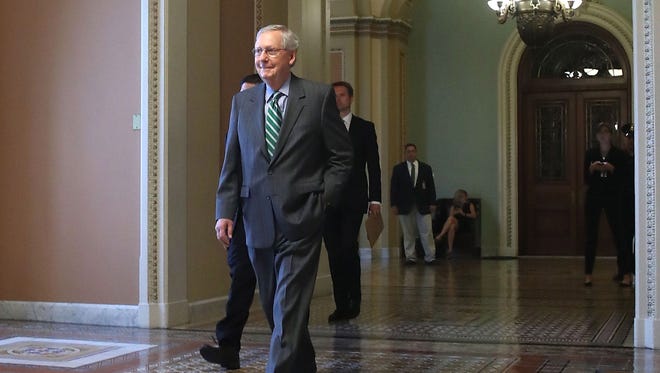By keeping money for subsidies, Senate health care bill may lower premiums

Insurers and about 7 million consumers could benefit from a two-year extension of funding for subsidies to reduce out-of-pocket insurance costs in the new health care bill unveiled Thursday by Senate Republicans.
Uncertainty over these cost sharing subsidies have been a central concern for insurers, some of which exited some Affordable Care Act exchanges while others added about 25% to the premium rates they proposed to state insurance commissioners this week to compensate.
That assumes, however, that the Senate bill is passed and the extension of subsidies survives negotiations with the House, which removed funding for the subsidies in the American Health Care Act, which passed in May. So far, the Trump administration has refused to commit to continue reimbursing insurers for the subsidies.
Keeping the subsidies and eliminating the penalty at the same time is a "contradiction in many ways," says Michael Dowling, CEO of Northwell Health, a large New York hospital chain and insurer.
"I think funding the subsidies is better than not," says Dowling, who was New York's health and human services director under Gov. Mario Cuomo. "But it's incumbent the subsidy really attracts people, so it has to be substantial."
Proposed rates in some states, which ranged from about 11% in Vermont to 50% in New York, could drop if the subsidies remain.Some states asked insurers to price as if subsidies would continue to be paid and the mandate would be enforced, but insurers in other states priced higher just in case.
Proposed rate increases would be far lower if not for this "Trump Tax," said Charles Gaba, a data expert who runs ACASignups.net.

About two-thirds of the amount of premium increases proposed for 2018 were due to questions about whether the administration would pay the subsidies.and enforce the mandate that everyone have insurance, the consulting firm Oliver Wyman estimated June 14.
The Senate bill removes the penalty most everyone but the lowest income have to pay if they don't have health insurance.
Insurers support the mandate because healthier people are less likely to buy plans if there's no penalty and they're needed to offset the cost of covering sicker people.
Senate Majority Leader Mitch McConnell, R-Ky., expects the bill to come to the floor for a vote as early as next week, after the non-partisan Congressional Budget Office has estimated its cost and impact.
Along with steep losses, insurers including Anthem in Ohio and Aetna cited this uncertainty when explaining decisions to depart states' insurance markets. Daniel Hilferty, CEO of Independence Blue Cross and Blue Cross Blue Shield of Tennessee are among those publicly saying their filings are not final decisions to stay on the exchanges.
"For the first time, this has to be wait and see," Hilferty said in an interview Tuesday.
Read more:
Senate Republicans unveil health care bill that slashes taxes, rolls back Medicaid
Senate health care bill: Here's how it would affect you
Trump: Senate health care bill needs 'a little negotiation'
Protesters gather in front of Mitch McConnell's office for 'die-in'
Senate Democrats launch tactics to slow work on health care bill
Insurers make Obamacare deadline decisions, but can still drop out